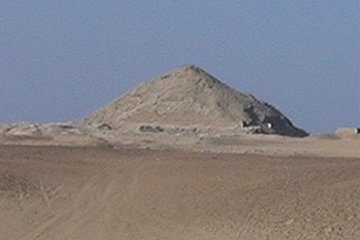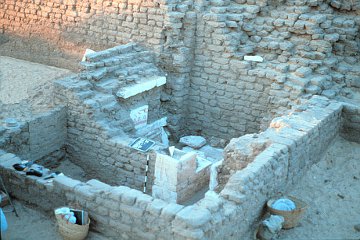Golden Toenails
The earliest known metal statue of anything like life-size proportions is that of Pepi I of the 6th Dynasty of Egypt. This statue, which is actually two statues, one inside the other, was originally found buried in mud and sand inside one of the shrines of the temple at Edfu, which is rather odd, because this temple was built during the Greek period, nearly two thousand years later than the 6th dynasty.
The statue was made of cast copper plates cleverly joined together with nails and shows Pepi striding forward, arms stiffly by his side. Curiously, the statue had golden toe nails! Since its discovery Pepi's statue has been in the Cairo Muesuem, but two years ago it was removed for restoration because it had become corroded.
The repairs required very delicate work, for ancient copper is very brittle. A small instrument, similar to that used by a dentist to remove plaque, had to be used to remove the worst of the corrosion. Recently the statue was put back on display as one of the treasures of the museum.

| |
| The pyramid and mortuary temple of Pepi I. |
Pepi probably ruled from Memphis near Cairo and his pyramid is at Saqqara, the burial ground for the royal city. His pyramid is fairly small and the exterior is in a rather bad state of disrepair, but it is the interior which is important. This was the first pyramid discovered with the so-called "Pyramid Texts" carved on the walls inside.
The texts are really spells or curses, designed to protect the deceased in the afterlife. Many of the spells describe the journey of the king to the next world and his activities on arrival. There are also hymns to the gods and prayers for the dead king. There are more than 700 of these spells; 228 were found in the pyramid of Unas but even more were found in Pepi's pyramid, making his the most extensive collection of such texts ever found.
One unusual statue of Pepi shows him in a kneeling position, holding votive bowls in his hands. This is a typical royal pose; the unusual aspect is the distinct smile on Pepi's face. Most of the pharaohs took life seriously and are depicted with stern looks on their faces. Pepi, however, is smiling broadly which is, perhaps, surprising, considering some of the troubles of his reign.

| |
| The chapel in the mastaba of Weni the Elder at Abydos. Weni's stele was found on the wall of the chapel. |
During much of Pepi's 53 year reign he had a trusty servant by the name of Weni. A stone slab found at Abydos tells how Weni, a man of humble birth, rose to one of the most exalted positions in the land. Weni apparently fulfilled his duties to Pepi's satisfaction, because he was made a confidant and courier of the king and was granted permission to make a fine tomb and a valuable sarcophagus in which to be buried.
On his funerary slab he wrote,
"His Majesty caused a god's seal-bearer to cross the Nile with a company of sailors under him to bring me this sarcophagus. It returned with him in a great barge of the court, together with its lid, a doorway, a lintel, two jambs and a libation table. Never had the like been done for any servant."
Weni was also appointed as a judge and felt that he fulfilled this responsibility to the king's satisfaction. He boasted:
"Whilst I was a magistrate His Majesty made me a Sole Friend and Overseer of the Tenants of the Palace and I displaced four overseers of the Tenants of the Palace who were there. I acted to His Majesty's satisfaction in giving escort, in preparing the king's path and in taking up courtly position, doing everything so that His Majesty praised me beyond anything for it."
Probably the most difficult case Weni had to investigate came from inside the royal harem. Weni does not spell out the exact nature of the problem with the ladies of the harem, but it is not difficult to guess. Among the multiplicity of royal wives there would be jealousy and suspicion, with the ladies vying for the king's favour for themselves and aiming to have their sons inherit the throne. In Pepi's case these jealousies broke out in pitched legal battles - enough to wipe the smile off any monarch's face. Weni felt extremely flattered to be given such a confidential assignment.
"When there was litigation in private in the king's harem against the queen, His Majesty caused me to go to hear the matter alone, without there being any vizier or any official there, only myself alone, because of my excellence and of my being firmly planted in the heart of His Majesty and because His Majety had confidence in me. It was I who put it in writing alone with one magistrate, though my rank was that of an Overseer of the Tenants of the Palace. Never before had the like of me heard a secret matter of the king's harem, but His Majesty caused me to hear it because I was excellent in the heart of His Majesty beyond any official of his."
Weni was also appointed to lead a military invasion. It is hardly likely that he, a civil servant, was made the miliatary commander of the army, so perhaps he could be called the Minister of Defence, but he apparently accompanied the army as a sort of liaison officer.
"When His Majesty inflicted punishment upon the Asiatics and Sand-dwellers, His Majesty made an army of many tens of thousands from the entire land of Upper Egypt, from Elephantine in the south to Medjineye in the north. ... His Majesty sent me forth at the head of this army."
It seems that Weni had a good reputation for arbitration, both in domestic matters and on the battle field. The army was a motley collection of troops from many areas, with differing ethnic backgrounds, and friction could be expected, but Weni was equal to the task. Weni was responsible for the good behaviour of the troops.
"It was I who was in command of them, though my office was only that of an Overseer of the Tenants of the Palace, because I was well suited to prevent one from quarreling with his fellow, to prevent any of them from taking bread or sandals from the wayfarer, to prevent any of them from taking a loin cloth from any village, to prevent any of them from taking any goat from any of the people."
As far as Weni was concerned, his job was well done. He concluded by saying:
"This army returned in peace, it had slain troops in many tens of thousands. This army returned in peace, it had carried away very many troops as prisoners and His Majesty praised me on account of it more than anything."
Of course, we do not have Pepi's version of these affairs, but Weni cannot have been straying too far from the truth, for he was still in office when Pepi's long reign came to an end and Pepi's successor, Merenre, assumed the throne. To begin with, possibly due to his advanced age, Weni only held the office of Chamberlain and Sandal Bearer to the new king. However Weni's illustrious career had not ended. He was dispatched to an alabaster quarry to supervise the hewing of a great offering table for the king, a task which necessitated the building of a special ship 60 cubits long (about 90 feet). He was also appointed to cut five navigable channels in the first cataract of the Nile at Aswan.
Weni's boastful biography gives us some detailed insights into the reigns of Pepi and his successor which we would not otherwise have. Besides the problems with his harem, Pepi faced threats from his neighbours and indiscipline from his troop and was no doubt glad to have such a trouble-shooter as Weni. Maybe that was the source of the smile on Pepi's face.





